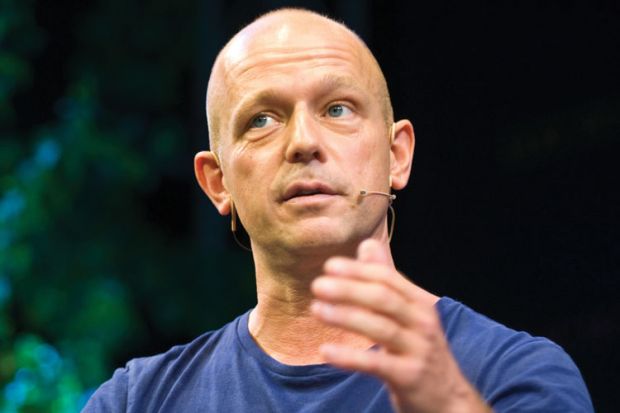As former strategy adviser to David Cameron, Steve Hilton is probably most famous for introducing the concept of the “Big Society” to the UK, to the bemusement of some Conservatives.
But after his stint as a visiting professor at Stanford University, he has spoken about how the Californian higher education institution has had a “profound effect” on his thinking.
Mr Hilton has been teaching on public policy, including at the university’s Hasso Plattner Institute of Design, also known as the d.school. That institute “taught me this methodology, this approach to innovation and problem-solving that is completely different to the way we used to go about it in government”, he told Times Higher Education.
Mr Hilton returned to the UK from California for a stint promoting his book, More Human: Designing a World Where People Come First, bringing back an argument that massive open online courses can remedy inequality and a suggestion that Stanford shows more “readiness to engage with the world” than most UK universities.
Boot out bureaucracy
To Mr Hilton’s critics, the Big Society idea was a failure at the 2010 general election. But following his exit from government in 2012, when he departed for Stanford, his book is another attempt at pressing his argument on the need to topple what he sees as centralised and dehumanised bureaucracies in government and business, bringing a devolution of power to the most local level possible.
Mr Hilton, famously known for padding around Downing Street in his socks, attracted a diverse audience to a recent discussion of his book at the right-leaning Policy Exchange thinktank, including Jon Cruddas, the Labour MP who helped to shape his party’s manifesto, and Lord Wood of Anfield, who served as an adviser to Ed Miliband, the former Labour leader, until the general election.
Stanford’s d.school is focused on “design in its broader, deeper sense of innovation”, said Mr Hilton, whose T‑shirt when he met THE was low-key compared with the one he wore at the Policy Exchange event, which was emblazoned with the word “GREAT”.
He argued that while ministers, advisers and civil servants “definitely think they are taking into account people’s real needs when they are designing a policy and implementing a policy, it’s just scratching the surface compared to the depth and seriousness with which you try to understand people’s needs in the design-thinking process that is taught at the d.school”.
Mr Hilton called Stanford “a genuine marketplace of ideas. There’s no university authority wanting to see your curriculum or what you’re planning to teach. You offer a course, it’s listed in the guide; [if] students come, that’s great. If they don’t come, you don’t have anyone to teach.”
Stanford, he said, is “literally entrepreneurial in that students were starting businesses. That…is encouraged…it’s seen as part of the mission, which is to educate people who have an impact on the world.”
Asked how he thought universities in the UK might be improved, he said: “I think there are exceptions, but having seen the comparison with Stanford and some of the universities here – and I wouldn’t claim to know them well – I think that there’s a massive difference in attitude right across the board…[there’s a] much greater sense of openness at Stanford, there’s a readiness to engage with the world.”
He went on to suggest that UK universities may have an attitude that is “too insular, too inward-looking – again, that’s a sweeping statement, it may not apply to all, but that’s my general impression”.
Moocs: the essential upgrade
The book argues the case for lifelong training as a “vital weapon in the fight against inequality”. In that context, it refers to Moocs, in particular the platform Udacity, founded by Sebastian Thrun, professor of computer science at Stanford.
Mr Hilton said: “Generally speaking, I think the idea that we’re going to succeed in dealing with inequality just by bringing down the people at the top is not right…the issue is you’ve got so many jobs that are threatened by technology or globalisation or a combination of the two.”
He continued that it is “not a sensible strategy to try to pretend you can hang on to the jobs; what you want is for people to be able to do the new jobs that are coming along to replace them”.
And he added: “What I think we need is a system which can respond flexibly to what is needed in the labour market, [so] people can very quickly – in a way that fits with their life – upgrade their skills so that they can be more productive and climb the ladder.
“I see the kinds of things that Udacity are doing and others, Coursera [another Mooc platform], that flowed from that Moocs movement, as being a real part of that. Because it does give you the opportunity to do skills acquisition in a way that really works for you: it’s customised, personalised, fits in with your life.”
POSTSCRIPT:
Article originally published as: California dreaming: from the ‘Big Society’ to new design for life (4 June 2015)
Register to continue
Why register?
- Registration is free and only takes a moment
- Once registered, you can read 3 articles a month
- Sign up for our newsletter
Subscribe
Or subscribe for unlimited access to:
- Unlimited access to news, views, insights & reviews
- Digital editions
- Digital access to THE’s university and college rankings analysis
Already registered or a current subscriber?




